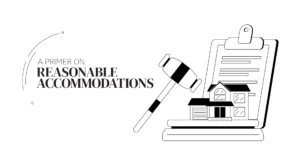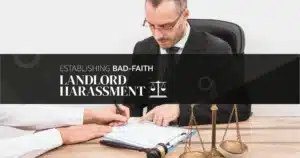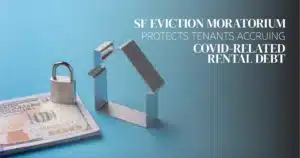I’ve seen this story many times in my work as a tenant attorney.
One of our clients, Maria, sat at her kitchen table staring at a letter from her landlord. The letter said her rent would jump by $600 next month. Her hands shook. She already worked two jobs. She barely had enough for food and medicine for her son.
She asked herself, “Can this even be legal? Can he just raise my rent like this?” Fear filled her chest. If she couldn’t pay, would she lose her home? Would she and her son have to sleep in her car?
Many renters today know this feeling. Rent hikes hit hard. The numbers look impossible. Landlords sometimes use fear to make tenants stay quiet. But here’s the truth: not every rent increase is legal.
So, what do you do when your landlord tries to raise your rent in a way that breaks the law? How do you fight back without losing your home? And where do you go when the law feels too big to face alone?
Why Is a Rent Hike Unlawful?
Many renters think landlords can raise rent whenever they want. But that’s not true. Cities, states, and even leases set rules. When landlords break those rules, the rent hike is unlawful.
Maria’s story is not rare. Across the country, renters are under pressure. The 2025 State of the Nation’s Housing report shows shocking numbers:
- 22.6 million renters (50%) paid more than they could afford.
- 12.1 million renters (27%) spent over half their income on housing.
- 83% of renters making under $30,000 were cost-burdened.
- 67% of those renters faced severe burdens.
- Over 70% of renters earning $30,000–$44,999 struggled with rent.
- Nearly half of renters making up to $74,999 were burdened, too.
- Many low-income renters had only $250 left each month after rent.
Think about that. How do you buy food, pay for medicine, or cover gas with only $250 left?
Now add in unlawful rent hikes. The report found that 1 in 5 low-income renters faced illegal increases that broke local rent caps. That’s millions of families asked to pay money they did not even owe.
So, what could Maria do? She could gather her lease, the notice, and her city’s rent rules. She could compare them. She could prove the hike crossed the line. Knowledge turns fear into action.
How to Contest a Rent Increase
Maria felt stuck. But she learned that one simple step could help: put everything in writing.
Cities and states often require written disputes before tenants can move forward. A case called Rich v. Schwab (1981) shows why it matters. The landlord gave notice only 58 days before the increase. The law required 60 days. The court said the notice was “void.” The tenants won.
Maria followed that lesson. She wrote a calm letter to her landlord. She said, “This increase breaks our local rent rules. I formally dispute it.” She kept a copy. Then she filed a complaint with her rent board. That one letter shifted the power.
Have you written your letter yet? That letter may be the first step to saving your home.
Why Landlords Raise Rent Illegally
Why would landlords risk breaking the law? The truth is greed, confusion, or even bold calculation.
Look at this most recent case. In August 2025, the New York Attorney General and the state housing agency sued Zara Realty Holding Corp. The company broke rent-stabilization laws. They overcharged tenants using subsidies. They ignored rent reduction orders. They even sued tenants who couldn’t pay their fake charges.
Why do this? To push tenants out. To reset rents higher. To make more money.
Maria’s landlord hoped she would panic and leave quietly. It happens every day across the country. When tenants don’t know their rights, landlords take advantage. But with the law and with legal aid, renters can push back.
How to Dispute a Rent Hike in Court
Sometimes letters are not enough. Some landlords refuse to back down. That’s when tenants may need the courts.
A 2024 study in the Law and Society Review proved something important. In the New York City Housing Court, tenants with lawyers did much better. Only 22% of represented tenants lost compared to 51% of those without lawyers. That is less than half the loss rate.
What does that mean? It means courts will protect tenants—but only if tenants show up with proof and support.
Maria’s case stayed with her local rent board. But if it had gone to court, her letters, her lease, and her city’s rules would have helped her. The law may look scary. But it can be powerful when you use it.
How to Challenge Unlawful Rent Hike
Maria realized she didn’t have to fight alone. She contacted a tenant-rights attorney. Together, they built her case.
A recent case, Xavier v. Subramaniam (2023), shows how this works. The landlords raised the rent without proper notice. The tenants fought back. The board ruled for the tenants. The landlords had to return $11,053 in overcharges.
That case shows what happens when tenants get legal help. They walk into the room, not scared, but strong. They have facts. They have rules. They have justice.
Do you feel powerless? You don’t have to. The law is on your side. With counsel, fear turns into fairness.
And How to Stop Illegal Rent Increase
Stopping an illegal increase often means acting fast. If you wait, landlords gain power. If you act early, you gain leverage.
A 2025 study by landlord-tenant law experts at the national Legal Services Corporation proved this point. It showed that tenants with lawyers who acted quickly were far more successful. Acting within days, not months, changed outcomes.
Maria acted the very next day. She wrote her letter. She called a lawyer. She refused to pay the unlawful amount. Her landlord backed down.
So, what’s the lesson? Don’t wait. Don’t hope it goes away. You can stop illegal increases, but only if you challenge them right away.
Keeping Home, Keeping Hope
Maria’s story is not rare. It happens in every city, every neighborhood. But renters are not powerless. Laws protect them. Courts enforce those laws. Attorneys fight for them.
At The Law Firm for Tenant Rights, Inc., we believe every family deserves a safe, fair home. We fight for renters like Maria every single day. And we win.
Has your landlord raised your rent in a way that feels wrong? Don’t sit in fear. Call us. We will help you stand tall, fight back, and keep your home.
Your rights matter. Your home matters. Call us today.
FAQs
- How to fight illegal rent increases?
Gather your lease, write a dispute letter, and call a lawyer. - Why is the rent hike unlawful?
Because it breaks rent caps, lease terms, or notice laws. - How to contest a rent increase?
Send a written dispute and file it with your local rent board. - Why do landlords raise rent illegally?
Often to push tenants out and reset rent higher. - How to dispute a rent hike in court?
Bring your documents and present them before a judge or board. - Why are rent increases illegal?
Because landlords ignore caps or required notices. - How to challenge an unlawful rent hike?
Work with a tenant-rights attorney and show proof. - Why does the rent increase violate the law?
Because it breaks rent control laws or lease protections. - How to stop illegal rent increases?
Act fast, dispute in writing, and get legal help. - Can a lawyer help tenants fight rent hikes?
Yes. With a lawyer, tenants are three times more likely to win.





